Cockson Surname Ancestry ResultsOur indexes 1000-1999 include entries for the spelling 'cockson'. In the period you have requested, we have the following 68 records (displaying 11 to 20): Single Surname Subscription | | | Buying all 68 results of this search individually would cost £406.00. But you can have free access to all 68 records for a year, to view, to save and print, for £100. Save £306.00. More... |
These sample scans are from the original record. You will get scans of the full pages or articles where the surname you searched for has been found. Your web browser may prevent the sample windows from opening; in this case please change your browser settings to allow pop-up windows from this site. Inhabitants of Pittington, county Durham (1609)
'The booke of accomptes and recknings of this parrishe of Pittington wherin is conteined all thinges necessarie for the same accordinge to the Quene's Majestie's Injunctions and my lorde[ the bishop of Durham]'s Monitions.' Refers mostly to parishioners, but occasionally to outsiders on parish business.
COCKSON. Cost: £8.00.  | Sample scan, click to enlarge
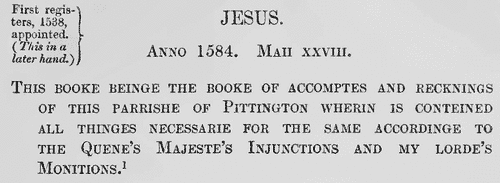
| London Marriage Allegations
(1521-1610)
London, Essex and part of Hertfordshire lay within the diocese of London. In the later 17th century the individual archdeaconry courts issued marriage licences, but for this period the only surviving material is from the overarching London Consistory court. The main series of marriage allegations from the consistory court starts 7 December 1597, and these were extracted by Colonel Joseph Lemuel Chester; Colonel Chester then discovered earlier material, back to 5 January 1521, in Vicar-General's Books of the Principal Probate Registry. The notices in these books were much briefer, but as well as extending back so much earlier, they included additional material for 1597 onwards. All this he collated with the consistory court extracts, and the text was edited by George J. Armytage and published by the Harleian Society in 1887. A typical later entry will give date; name, address and occupation of groom; name, address and condition of his intended bride, and/or, where she is a spinster, her father's name, address and occupation. Lastly we have the name of the church where the wedding was going to take place; or the words Gen. Lic. signifying a general or open licence.COCKSON. Cost: £4.00.  | Sample scan, click to enlarge

| Inhabitants of Pittington, county Durham (1612)
'The booke of accomptes and recknings of this parrishe of Pittington wherin is conteined all thinges necessarie for the same accordinge to the Quene's Majestie's Injunctions and my lorde[ the bishop of Durham]'s Monitions.' Refers mostly to parishioners, but occasionally to outsiders on parish business.
COCKSON. Cost: £8.00.  | Sample scan, click to enlarge
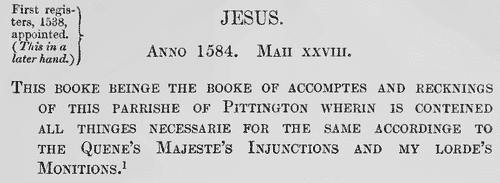
| Inhabitants of Pittington, county Durham (1614)
'The booke of accomptes and recknings of this parrishe of Pittington wherin is conteined all thinges necessarie for the same accordinge to the Quene's Majestie's Injunctions and my lorde[ the bishop of Durham]'s Monitions.' Refers mostly to parishioners, but occasionally to outsiders on parish business.
COCKSON. Cost: £8.00.  | Sample scan, click to enlarge
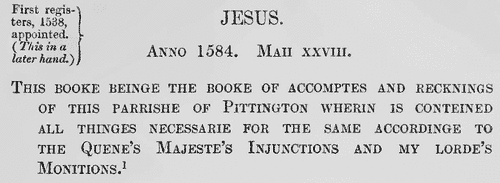
| Inhabitants of Pittington, county Durham (1616)
'The booke of accomptes and recknings of this parrishe of Pittington wherin is conteined all thinges necessarie for the same accordinge to the Quene's Majestie's Injunctions and my lorde[ the bishop of Durham]'s Monitions.' Refers mostly to parishioners, but occasionally to outsiders on parish business.
COCKSON. Cost: £8.00.  | Sample scan, click to enlarge
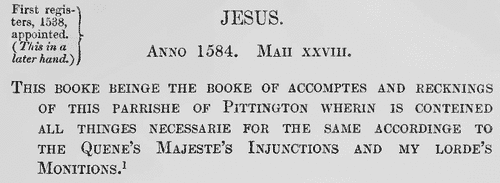
| Inhabitants of Pittington, county Durham (1618)
'The booke of accomptes and recknings of this parrishe of Pittington wherin is conteined all thinges necessarie for the same accordinge to the Quene's Majestie's Injunctions and my lorde[ the bishop of Durham]'s Monitions.' Refers mostly to parishioners, but occasionally to outsiders on parish business.
COCKSON. Cost: £8.00.  | Sample scan, click to enlarge
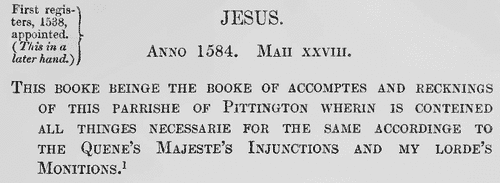
| Lancashire and Cheshire Marriage Licences
(1616-1624)
Licences for intended marriages in Chester archdeaconry, which covered Cheshire and Lancashire south of the Ribble (by far the most populous part of that county)COCKSON. Cost: £4.00.  | Sample scan, click to enlarge

| Wills proved at York: Names of Testators
(1627-1637)
The diocese of York comprised most of Yorkshire, and Nottinghamshire: the York Exchequer court was the ordinary probate jurisdiction for the Yorkshire part of the diocese, but some wills from Nottinghamshire and other parts of the province of York were also proved there. Dr Francis Collins compiled this index to the transcribed wills of the Prerogative and Exchequer Courts in the York registry proved from 1627 to 1637. The date on the left is that of probate; the testator's full name is then given (surname first), parish or place of abode, and sometimes occupation, and date that the will was executed; and volume and folio number where it the transcript commences. The Act Books were used by Dr Collins to supply deficiencies in the information from the transcripts.COCKSON. Cost: £2.00.  | Sample scan, click to enlarge

| Lancashire and Cheshire Marriage Licences
(1639-1644)
Licences for intended marriages in Chester archdeaconry, which covered Cheshire and Lancashire south of the Ribble (by far the most populous part of that county)COCKSON. Cost: £4.00.  | Sample scan, click to enlarge

| Royalist delinquents in county Durham and Northumberland, their successors, tenants, debtors and creditors
(1648-1660)
King Charles I was executed 30 January 1649, the kingship was abolished and government by a Council of State was established 14 February 1649. Oliver Cromwell became Lord Protector 16 December 1653; died 3 September 1658; and was succeeded by his son Richard, who abdicated 24 May 1659. Charles II was established on the throne 29 May 1660. From 1648 to 1660 parliament sequestrated royalists' estates, restoring many by a process of heavy fines called compounding; this was administered by the Committee for Compounding, working through county committees. These raised considerable amounts of money, money which was vitally necessary for maintaining the parliamentary army's campaigns to subdue opposition in the three kingdoms - England, Scotland and Ireland. The raising and delivery of these monies was the responsibility of the Committee for Advance of Money (C. A. M.). The records of these committees were detailed and extensive, amounting to about 300 volumes, and were calendared for the Public Record Office by Mary Anne Everett Green. Abstracts of the county Durham and Northumberland entries were collated by Richard Welford with a manuscript transcript of the proceedings of the parliamentary commissioners in county Durham surviving in Durham cathedral library, and published by the Surtees Society in 1905. The persons named in these abstracts are not only the delinquents themselves, and those who succeeded them in their estates, but tenants, debtors and creditors, and local constables and officials of the committees.COCKSON. Cost: £4.00.  | Sample scan, click to enlarge

|
Research your ancestry, family history, genealogy and one-name study by direct access to original records and archives indexed by surname.
|












